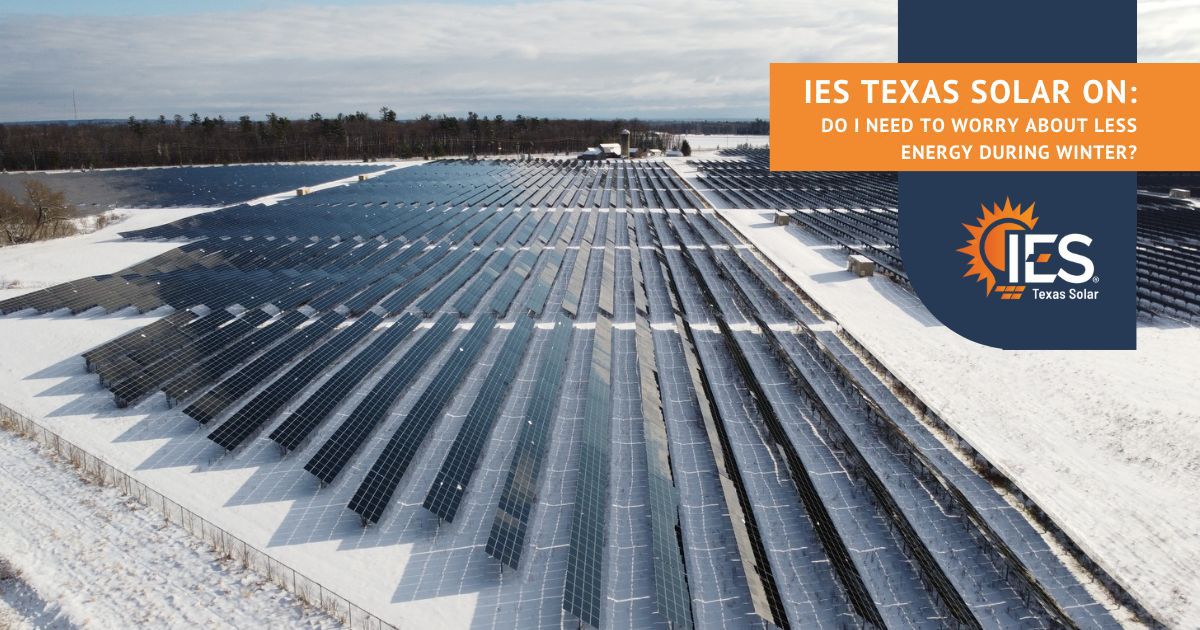
Time to read: 4 minutes
January 10, 2023
Winter is here and with it comes cloud cover, colder weather, and snow. So how does that impact homes and businesses using solar power? If the sun is not out and shining, then surely solar panels can’t be working, right? Not exactly. Let’s dig into it as we take a look at winter weather and solar panel efficiency.
Energy from the sun is the most abundant energy resource on earth. In fact, the energy needs of the entire world for a year can be met with just the amount of sunlight that hits the earth in an hour and a half. So it’s no wonder that so many people have taken advantage of this renewable energy to power their homes and break away from the power grid. But what happens when the sun is hidden behind those winter clouds?
Well, as they say, behind every dark cloud is a silver lining. And in this case the silver lining is that while clouds can potentially block light from the sun, it really comes down to what types of clouds. Generally, higher clouds reflect less sunlight energy back into space than low clouds, meaning more light is getting through and reaching your panels. Lower clouds reflect more light. With low heavy cloud cover, on average solar panels could generate 10% to 25% of what they would normally generate with direct sunlight. But since Texas gets plenty of sunshine, these periods of heavy cloud cover are few and far between.
Another silver lining, particularly in winter months, is that cloudy conditions could produce a positive effect on solar energy. In the case of high-altitude clouds that contain ice crystals, it produces an effect known as “cloud lensing” due to the clouds acting as a lens that focuses and increases light reaching the earth. This increased light provides additional energy to solar powered systems. In addition, when the outdoor temperature is cooler, like many other electronics, solar powered systems operate more effectively, meaning a properly designed system may be capable of producing more energy per hour than it would in extreme heat in the summer.
So to sum up, yes solar panels will continue to work on cloudy days, but at varying degrees of efficiency depending on how high and how dense the clouds are. Solar photovoltaic cells just need daylight, which can be diffused light, and not necessarily direct sunlight.
What about snow and ice?
Like clouds, heavy snow accumulation will also block the light from reaching solar panels, decreasing the amount of energy they are able to generate. This is one reason that many solar panels are installed at an angle so that snow and ice will have a harder time accumulating. Additionally, the heat generated by the solar powered system can also melt snow and ice on its own. Heavy extreme snowfall may require manual removal of the snow from the panels, which we recommend is only done when safe and with the proper safety gear.
Ready for some more silver linings? When snow is on the ground and not on your panels, it can have a positive effect. The snow on the ground reflects light back up toward your solar panels, providing a boost. Also, as snow and ice melt off your panels, or when it rains, it removes dirt and debris that can also impact efficiency.
So do I need to worry about having less energy in the winter?
Well, that depends. If you are currently, or looking to get, off the grid, winter months could impact your solar energy availability. If your solar powered system is being used to offset part or all of your energy requirements, you may see your electric bill rise slightly in the winter. In either case, the best way to prevent clouds, snow, ice or temperature from negatively impacting your home or business energy requirements is to invest in solar storage.
Because solar energy is not always produced or available right when we need it, solar energy storage technologies allow batteries to take in excess solar energy not being used during peak sunlight hours to be used at other times, such as when there is heavy dense cloud cover or during the increased darkness hours in the winter.
Many will not soon forget Winter Storm Uri from February 2021, where nearly 70% of Texans lost power at some point. While we all hope that something like that never happens again, the reality is that being fully reliant on the Texas power grid does come with some risk. Pairing solar power with a backup battery and/or a home standby generator is the perfect solution to minimize that risk.
Whether you have solar panels and are looking for options to maximize them to power your home through the winter months, or you are looking to make the switch to solar power, our experienced solar consultants understand local climate and energy needs in Texas and can help you design the perfect solar powered system, backup battery solution or home standby generator setup to keep your home or business out of the cold all winter long.
If you are considering switching to solar for your home or business, reach out to us by going to our website, iestxsolar.com, or by giving us a call at (855) 447-6527.
If you are considering switching to solar for your home or business, or if you have questions about your system, reach out to us by going to our website, iestxsolar.com, or by giving us a call at (855) 447-6527.
Sources:
https://scijinks.gov/solar-energy-and-clouds/
https://www. ecowatch.com/solar/do-solar-panels-work-cloudy-days
https://rvsolar connections.com/rv-air-conditioner-with-solar/
https://www.nesdis.noaa.gov/news/cloudy-days-and-solar-arrays
https://www.greencarreports.com/news/1135862_fully-electric-rvs-range-charging-challenges-electric-cars
https://comptroller.texas.gov/economy/fiscal-notes/2021/oct/winter-storm-impact.php
https://www.energy.gov/eere/solar/solar-integration-solar-energy-and-storage-basic